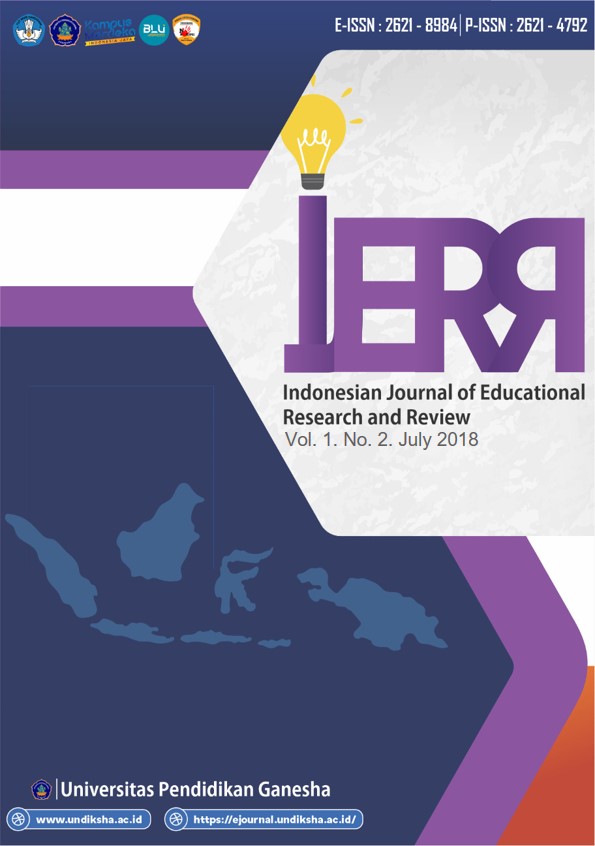HUBUNGAN ANTARA KEMAMPUAN LITERASI DENGAN KOMPETENSI INTI PENGETAHUAN BAHASA INDONESIA SISWA KELAS V SD GUGUS LETKOL WISNU DENPASAR UTARA TAHUN PELAJARAN 2017/2018
DOI:
https://doi.org/10.23887/ijerr.v1i2.14708Abstract
This study aimed to determine the significant relationship between the literacy skills with the core competency of knowledge of Indonesian language students of grade V SD Gugus Letkol Wisnu, North Denpasar, in the Lesson Year 2017/2018. This research is ex post facto research with correlation type. The population of this study is a class V student residing in SD Gugus Letkol Wisnu, North Denpasar Lesson Year 2017/2018 which has a population of 340 people. Determination of the sample used proportional random sampling technique with significant level 5% and obtained the number of samples from the population is 172 people. The data were obtained through the multiple-choice objective test of the literacy skills and the document recording of the core competency of knowledge of Indonesian language student. As the test is a normality test data distribution. After all prerequisite tests are met, the statistical analysis used in this next study is hypothesis test using product moment correlation analysis. Based on result of analysis then = 0,227. At the significant level of 5% with n = 172, then obtained = 0.148. Because > = 0.227 > 0.148 it can be interpreted that H₀ which reads there is not significant relationship between literacy skills with the core competency of knowledge of Indonesian language students of grade V SD Gugus Letkol Wisnu, North Denpasar, in the Lesson Year 2017/2018 is rejected and accepted. So it can be concluded that there is a significant relationship between literacy skills with the core competency of knowledge of Indonesian language students of grade V SD Gugus Letkol Wisnu, North Denpasar, in the Lesson Year 2017/2018, with a positive correlation direction, meaning the higher literacy skills then the higher the core competency of knowledge of Indonesian language students.
Keywords : Literacy skills, the core competency of knowledge, Indonesian
References
Abidin, Yunus, dkk. 2017. Pembelajaran Literasi: Strategi Meningkatkan Kemampuan Literasi Matematika, Sains, Membaca, dan Menulis. Jakarta: PT. Bumi Aksara.
Agung, A. A. Gede. 2014. Metodologi Penelitian Pendidikan. Yogyakarta: Aditya Media Publishing.
Agung, A. A. Gede. 2016. Statistika Dasar untuk Pendidikan. Yogyakarta: CV. Budi Utama.
Akhadiah, Sabarti, dkk. 1991. Bahasa Indonesia 1. Jakarta: Proyek Pembinaan Tenaga Kependidikan.
Badan Standar Nasional Pendidilkan. 2006. Panduan Penyusunan KTSP Jenjang Pendidikan Dasar dan Menengah. Jakarta: BSNP.
Dantes, Nyoman. 2007. Metodologi Penelitian untuk Ilmu-ilmu Sosial dan Humaniora. Singaraja: Universitas Pendidikan Ganesha.
Faizah, Dewi Utami, dkk. 2016. Panduan Gerakan Literasi Sekolah di Sekolah Dasar. Jakarta : Direktoral Jenderal Pendidikan Dasar dan Menengah Kementerian Pendidikan dan Kebudayaan.
Kharizmi, Muhammad. 2015. “Kesulitan Siswa Sekolah Dasar Dalam Meningkatkan Kemampuan Literasi”. Tersedia pada https.//jfkip.umuslim.ac.id/index. php/jupendas/article/view/233 (diakses tanggal 9 November 2017).
Kunandar. 2013. Penilaian Autentik (Penilaian Hasil Belajar Peserta Didik Berdasarkan Kurikulum 2013). Jakarta: PT Rajagrafindo Persada.
Maulidya, Siti. 2017. “Hubungan Antara Gerakan Literasi Sekolah Dan Kemahiran Membaca Pemahaman Siswa Kelas X Sekolah Menengah Atas Negeri 2 Tanjungpinang Tahun 2016/2017”. Tersedia pada https://scholar.google.com/scholar? um=1&ieUTF8&Ir&q=related:qXJ7O H5HZ-cTM:scholar.google.com/ (diakses tanggal 22 Februari 2018).
Musfiqon. 2012. Metodelogi Penelitian Pendidikan. Jakarta: PT. Prestasi Pustakaarya.
Netra, I.B. 1974. Statistik Inferensial. Surabaya: Usaha Nasional.
Permendikbud. 2015. Peraturan Menteri Pendidikan dan Kebudayaan Republik Indonesia Nomor 23 tahun 2015 Tentang Penumbuhan Budi Pekerti. Jakarta: Kementerian Pendidikan dan Kebudayaan.
Setyosari, H. Punaji. 2015. Metode Penelitian Pendidikan & Pengembangan. Jakarta: Prenadamedia Group.
Sholihah. 2017. “Hubungan Kemampuan Literasi Dasar dan Prestasi Belajar Bahasa Indonesia Siswa SMA Kelas X SMAN 2 Malang”. Tersedia pada https.//karyailmiah.um.ac.id/index.ph p/sastraindonesia/article/vie w/63271 (diakses tanggal 4 April 2018).
Siregar, Syofian. 2015. Statistika Terapan untuk Perguruan Tinggi. Jakarta: Prenadamedia Group.
Subandiyah, Heny. 2015. “Pembelajaran Literasi Dalam Mata Pelajaran Bahasa Indonesia”. Tersedia pada https.//journal.unesa.ac.id/index.php /paramasastra/article/view/1502 (diakses tanggal 8 November 2017).
Sugiyono. 2009. Metode Penelitian Pendidikan Pendekatan Kuantitatif, Kualitatif dan R&D. Bandung: Alfabeta.
Sugiyono. 2016. Metode Penelitian Pendidikan Pendekatan Kuantitatif, Kualitatif dan R&D. Bandung: Alfabeta.
Sumarwan, Eri. 2016. Literasi Anak Sebuah Panduan Memahami Baca Tulis Anak Sejak Dini. Yogyakarta: Gambang Buku Budaya.
Supardi. 2016. Aplikasi Statistika Dalam Penelitian Edisis Revisi. Jakarta Selatan: Change Publication.
Susanto, Ahmad. 2015. Teori Belajar & Pembelajarn di Sekolah Dasar. Jakarta: Prenadamedia Group.
Downloads
Published
How to Cite
Issue
Section
License
Authors who publish with the Indonesian Journal of Educational Research and Review (IJERR) agree to the following terms:
- Authors retain copyright and grant the journal the right of first publication with the work simultaneously licensed under a Creative Commons Attribution-ShareAlike 4.0 International License. that allows others to share the work with an acknowledgment of the work's authorship and initial publication in this journal.
- Authors are able to enter into separate, additional contractual arrangements for the non-exclusive distribution of the journal's published version of the work (e.g., post it to an institutional repository or publish it in a book), with an acknowledgment of its initial publication in this journal.
- Authors are permitted and encouraged to post their work online (e.g., in institutional repositories or on their website) prior to and during the submission process, as it can lead to productive exchanges, as well as earlier and greater citation of published work. (See The Effect of Open Access)









